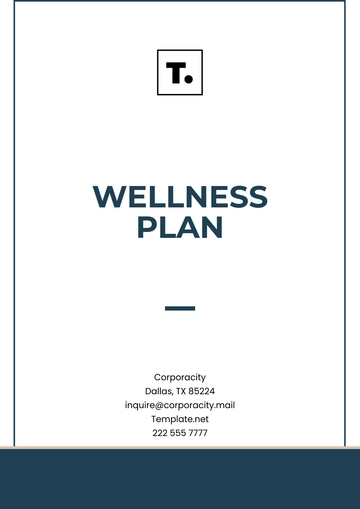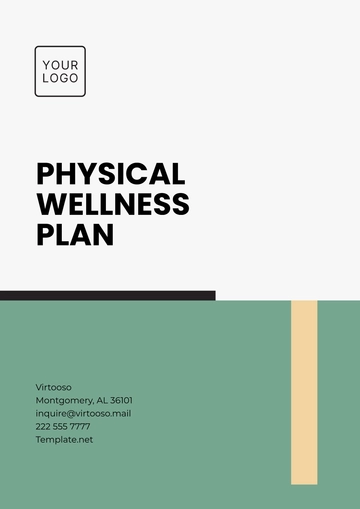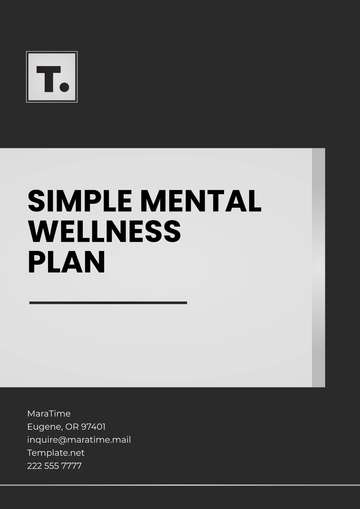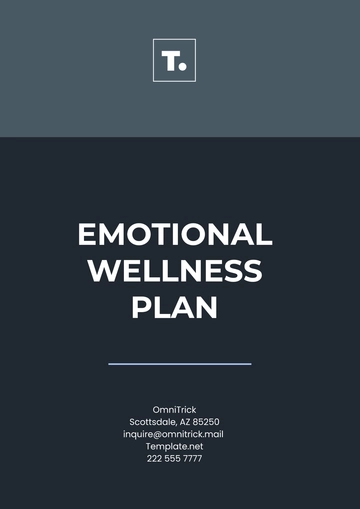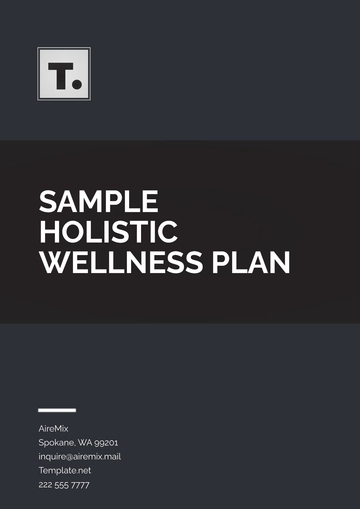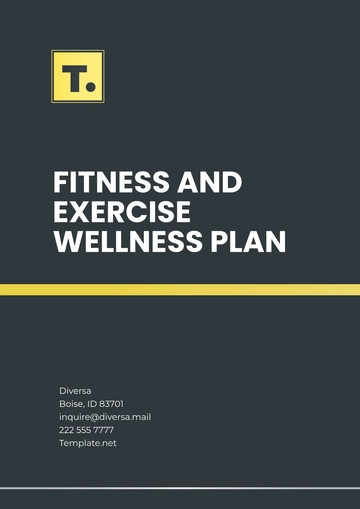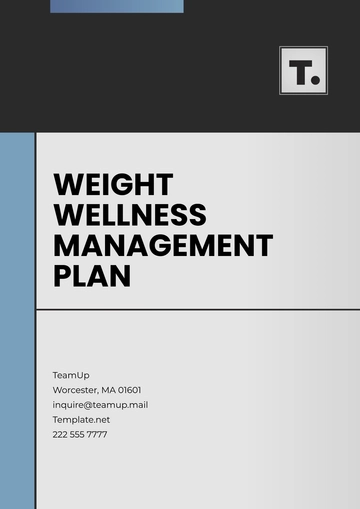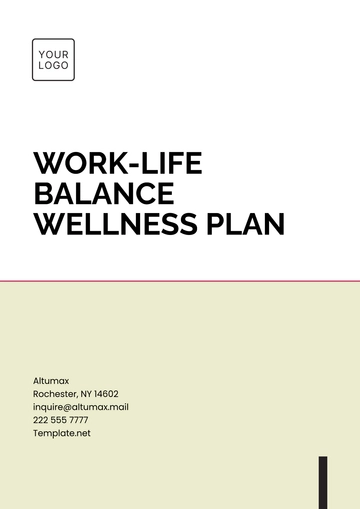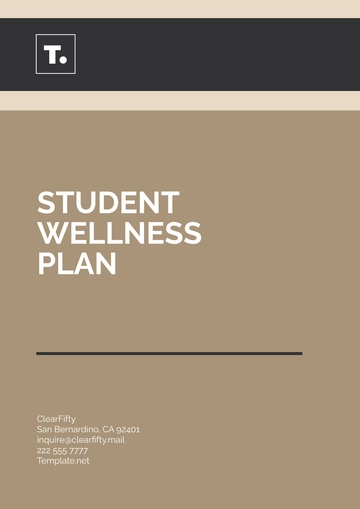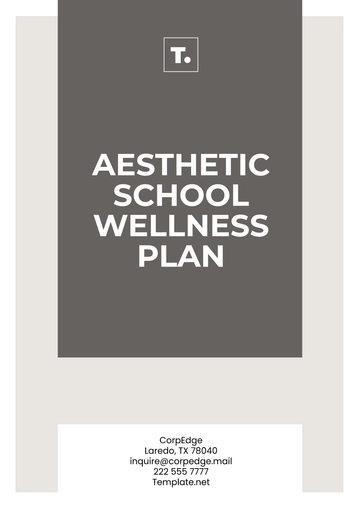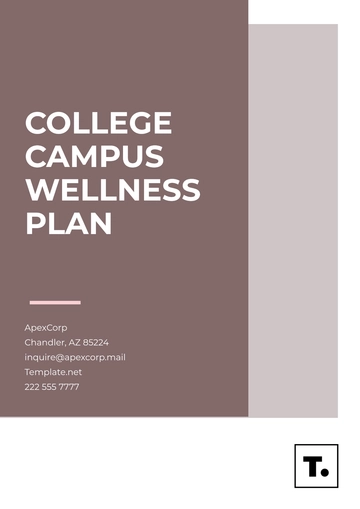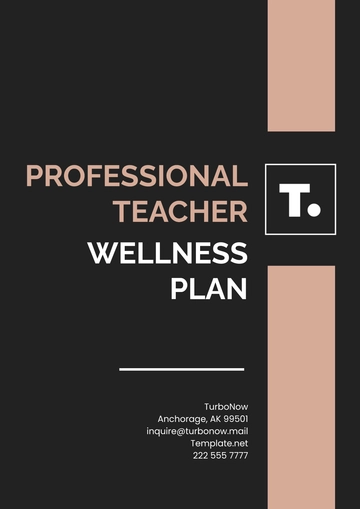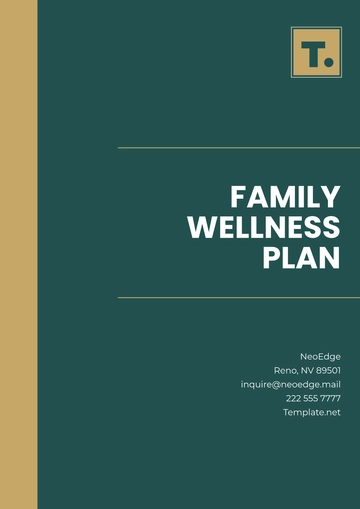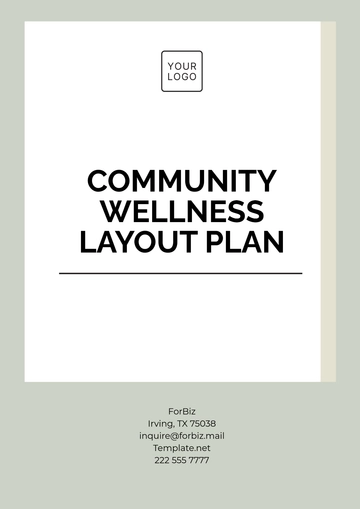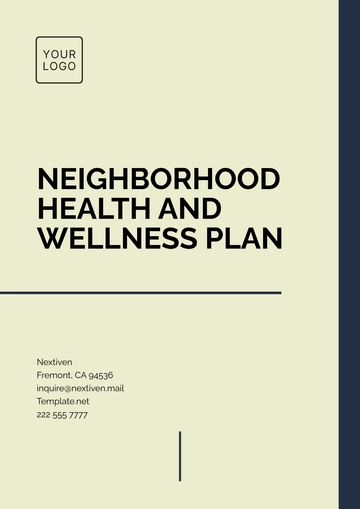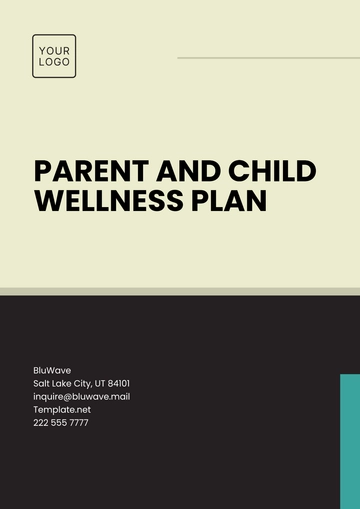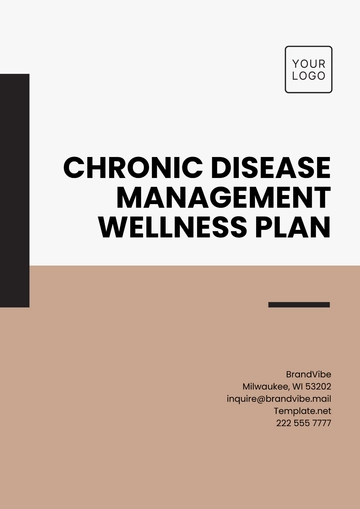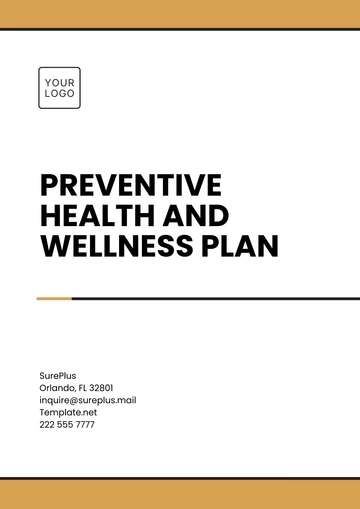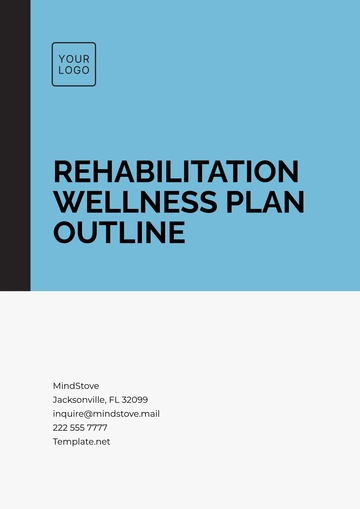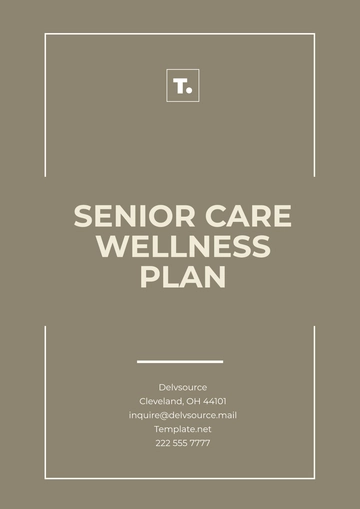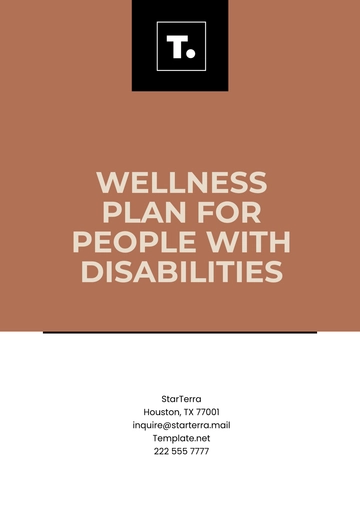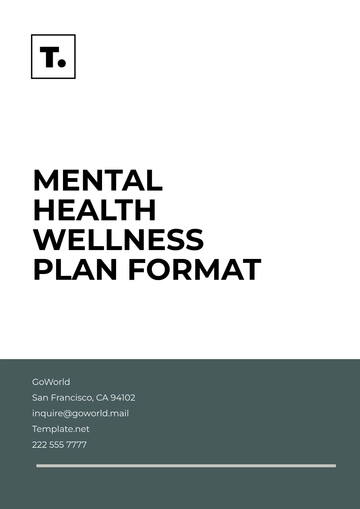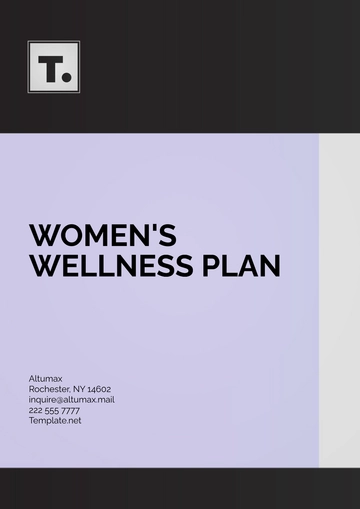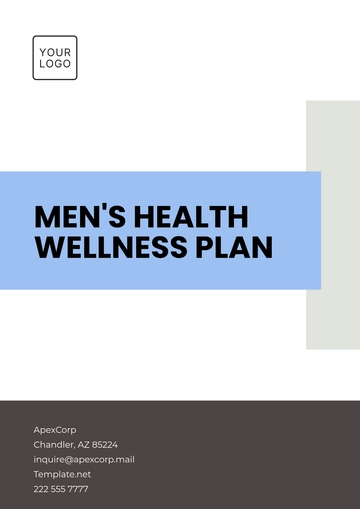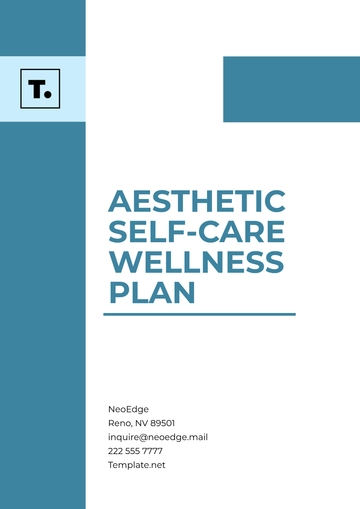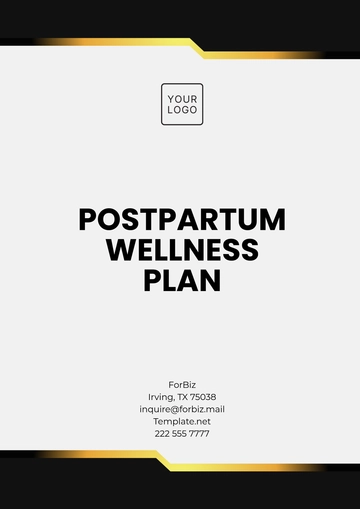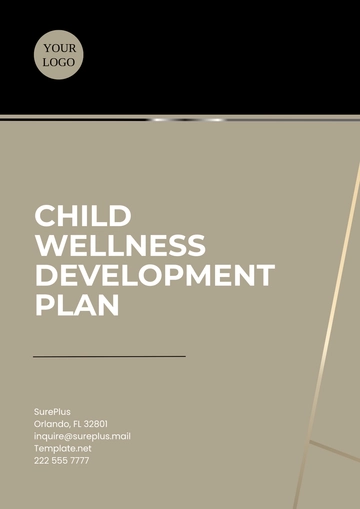Free College Campus Wellness Plan
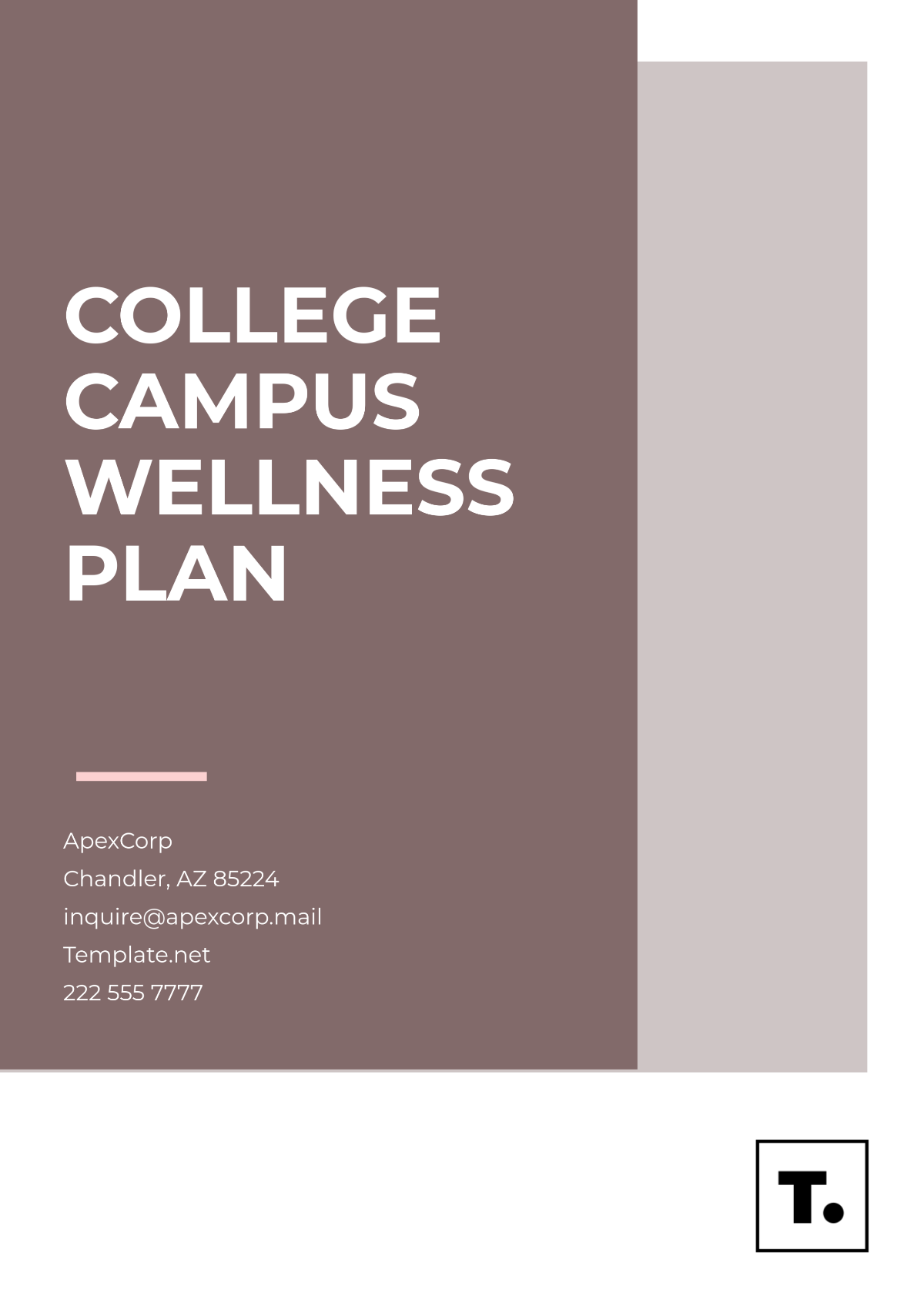
Prepared by: [Your Name]
Company: [Your Company Name]
Date: [Insert Date]
I. Introduction
The college years are a critical time for personal development, both academically and socially. Students face various challenges, including managing stress, maintaining physical health, and building emotional resilience. This College Campus Wellness Plan aims to promote the holistic well-being of students by providing resources and support that help them thrive academically, emotionally, and physically. By fostering a balanced, healthy lifestyle, the college aims to ensure that students succeed both in and out of the classroom.
II. Vision and Goals
Vision:
To create a campus environment where students can achieve their full potential by prioritizing their physical, mental, emotional, social, and academic wellness. The plan encourages a campus culture that fosters holistic health and well-being for all students.
Goals:
Promote Physical Health: Encourage healthy habits, including exercise, nutrition, and regular medical care.
Support Mental Wellness: Offer programs that address mental health issues and provide resources for stress management, counseling, and peer support.
Foster Emotional Resilience: Help students navigate emotional challenges, build resilience, and maintain a positive outlook throughout their college experience.
Enhance Social Wellness: Cultivate a strong sense of community and belonging, encouraging collaboration and student engagement.
Encourage Academic Wellness: Provide resources to help students manage academic stress, achieve work-life balance, and excel academically.
III. Key Areas of Focus and Strategies
A. Physical Wellness
Strategies:
Fitness and Recreation Programs: Offer a variety of fitness classes, such as yoga, pilates, and group exercise sessions, to encourage students to stay active. Provide access to gym facilities and outdoor activities like hiking and intramural sports.
Healthy Eating Initiatives: Provide nutritious meal options in campus dining halls and offer educational workshops on nutrition and healthy eating habits.
Health Screenings and Clinics: Provide regular health check-ups, including flu shots, blood pressure checks, and mental health screenings. Ensure students have access to medical care when needed.
Sleep Health Education: Promote good sleep hygiene and provide resources for students to improve their sleep habits, which are crucial for overall wellness.
Ergonomic Support: Offer ergonomic study and workspaces in common areas to promote physical comfort and reduce strain from prolonged sitting.
B. Mental Wellness
Strategies:
Counseling and Psychological Services: Provide confidential counseling sessions for students dealing with anxiety, depression, stress, or personal challenges. Ensure that these services are easily accessible.
Mental Health Workshops: Organize workshops on stress management, time management, coping strategies, and mindfulness practices to help students deal with academic pressures and life challenges.
Peer Support Groups: Establish peer support networks or student-led groups where students can connect, share experiences, and offer mutual support.
Mindfulness and Meditation: Offer meditation classes or create designated quiet areas on campus for students to practice mindfulness and relaxation techniques.
Crisis Intervention: Implement a robust system for students to seek help in crises, ensuring they receive immediate support and follow-up care when needed.
C. Emotional Wellness
Strategies:
Resilience Training: Offer programs or workshops that teach students how to build emotional resilience, handle setbacks, and stay emotionally balanced.
Stress Reduction Programs: Create spaces or events for students to relax, such as nature walks, stress-relief activities, or pet therapy sessions.
Celebrating Achievements: Organize regular recognition programs or celebrations to honor academic and personal achievements, fostering a sense of accomplishment and pride.
Emotional Support Resources: Provide easy access to mental health professionals, as well as online resources and self-help tools, to help students manage their emotions.
Gratitude and Reflection Practices: Encourage students to engage in activities like journaling or gratitude exercises that help them reflect on positive aspects of their lives.
D. Social Wellness
Strategies:
Community Building Activities: Organize social events such as game nights, movie screenings, volunteer opportunities, and student club fairs to help students build social connections and foster a sense of belonging.
Diversity and Inclusion Initiatives: Promote inclusion through campus-wide events, discussions, and cultural celebrations that celebrate diverse backgrounds and experiences.
Social Support Networks: Offer opportunities for students to engage with peers, whether through student organizations, peer mentoring programs, or group study sessions.
Volunteer and Service Opportunities: Create programs that allow students to give back to the community, such as service trips, local volunteering, or charity fundraising events.
Support for International Students: Provide specific resources to help international students adjust to campus life, including cultural exchange programs and language support.
E. Academic Wellness
Strategies:
Academic Support Services: Provide tutoring, academic advising, writing centers, and time management workshops to help students succeed academically.
Work-Life Balance Resources: Offer workshops and seminars on achieving a balance between academic responsibilities, social activities, and personal time.
Stress-Free Study Spaces: Designate quiet, comfortable study areas on campus where students can focus on their work in a calm and peaceful environment.
Time Management Workshops: Help students develop effective study habits and prioritize tasks to avoid procrastination and reduce academic stress.
Healthy Study Breaks: Encourage students to take regular breaks during study sessions and provide spaces for relaxation, such as outdoor lounges or meditation rooms.
IV. Implementation Plan
A. Roles and Responsibilities
Wellness Committee: Oversee the development and implementation of wellness initiatives. Monitor program effectiveness and gather feedback from students.
Campus Health Services: Provide medical care, counseling, and wellness resources to students, ensuring that they have access to essential services.
Student Affairs Office: Coordinate campus events and activities related to wellness, including social events, wellness workshops, and academic support programs.
Faculty and Staff: Promote wellness initiatives within classrooms and departments and support students in maintaining their health and well-being.
Students: Actively participate in wellness programs and provide feedback to help improve the campus wellness culture.
B. Timeline
Phase 1 (Month 1-3): Assess student wellness needs, launch foundational programs (health screenings, fitness classes, etc.), and create a wellness resource hub.
Phase 2 (Month 4-6): Launch mental health workshops, peer support programs, and social wellness events. Begin evaluating the effectiveness of early initiatives.
Phase 3 (Month 7-12): Expand wellness initiatives, incorporating more programs related to stress management, work-life balance, and emotional wellness. Gather comprehensive feedback from students and faculty.
V. Measurement and Evaluation
Key Performance Indicators (KPIs):
Participation Rates: Track student participation in wellness programs such as fitness classes, counseling sessions, and workshops.
Survey Results: Collect feedback through surveys to measure satisfaction and gather suggestions for improvement.
Student Well-Being Metrics: Measure improvements in student well-being through self-reported data on mental health, physical health, and academic performance.
Retention Rates: Monitor student retention rates and engagement in campus life as indicators of overall wellness and satisfaction.
Evaluation Methods:
Surveys and Focus Groups: Regularly survey students and hold focus groups to assess the impact of wellness initiatives and identify areas for improvement.
Annual Wellness Reports: Provide an annual report summarizing the success of wellness programs, student feedback, and recommendations for the upcoming year.
Ongoing Program Adjustments: Continuously adapt wellness programs to meet changing student needs and trends.
VI. Sustainability Plan
Continued Funding: Ensure ongoing funding through campus budgets, external grants, and partnerships with local businesses and organizations.
Student Leadership: Empower students to take leadership roles in wellness initiatives, providing opportunities for them to organize and lead wellness-related events and programs.
Campus Partnerships: Collaborate with local healthcare providers, fitness centers, and mental health organizations to enhance campus wellness offerings.
Program Evolution: Regularly update wellness programs to reflect the changing needs of students and the evolving wellness landscape on campus.
VII. Conclusion
The College Campus Wellness Plan aims to create a holistic, supportive environment where students can thrive academically, socially, emotionally, and physically. By prioritizing wellness and offering comprehensive programs in physical health, mental well-being, emotional resilience, social connection, and academic success, this plan will help students achieve their full potential and enjoy a balanced college experience. Through continuous evaluation and adaptation, this wellness plan will contribute to a healthy, thriving campus community.
- 100% Customizable, free editor
- Access 1 Million+ Templates, photo’s & graphics
- Download or share as a template
- Click and replace photos, graphics, text, backgrounds
- Resize, crop, AI write & more
- Access advanced editor
You may also like
- Finance Plan
- Construction Plan
- Sales Plan
- Development Plan
- Career Plan
- Budget Plan
- HR Plan
- Education Plan
- Transition Plan
- Work Plan
- Training Plan
- Communication Plan
- Operation Plan
- Health And Safety Plan
- Strategy Plan
- Professional Development Plan
- Advertising Plan
- Risk Management Plan
- Restaurant Plan
- School Plan
- Nursing Home Patient Care Plan
- Nursing Care Plan
- Plan Event
- Startup Plan
- Social Media Plan
- Staffing Plan
- Annual Plan
- Content Plan
- Payment Plan
- Implementation Plan
- Hotel Plan
- Workout Plan
- Accounting Plan
- Campaign Plan
- Essay Plan
- 30 60 90 Day Plan
- Research Plan
- Recruitment Plan
- 90 Day Plan
- Quarterly Plan
- Emergency Plan
- 5 Year Plan
- Gym Plan
- Personal Plan
- IT and Software Plan
- Treatment Plan
- Real Estate Plan
- Law Firm Plan
- Healthcare Plan
- Improvement Plan
- Media Plan
- 5 Year Business Plan
- Learning Plan
- Marketing Campaign Plan
- Travel Agency Plan
- Cleaning Services Plan
- Interior Design Plan
- Performance Plan
- PR Plan
- Birth Plan
- Life Plan
- SEO Plan
- Disaster Recovery Plan
- Continuity Plan
- Launch Plan
- Legal Plan
- Behavior Plan
- Performance Improvement Plan
- Salon Plan
- Security Plan
- Security Management Plan
- Employee Development Plan
- Quality Plan
- Service Improvement Plan
- Growth Plan
- Incident Response Plan
- Basketball Plan
- Emergency Action Plan
- Product Launch Plan
- Spa Plan
- Employee Training Plan
- Data Analysis Plan
- Employee Action Plan
- Territory Plan
- Audit Plan
- Classroom Plan
- Activity Plan
- Parenting Plan
- Care Plan
- Project Execution Plan
- Exercise Plan
- Internship Plan
- Software Development Plan
- Continuous Improvement Plan
- Leave Plan
- 90 Day Sales Plan
- Advertising Agency Plan
- Employee Transition Plan
- Smart Action Plan
- Workplace Safety Plan
- Behavior Change Plan
- Contingency Plan
- Continuity of Operations Plan
- Health Plan
- Quality Control Plan
- Self Plan
- Sports Development Plan
- Change Management Plan
- Ecommerce Plan
- Personal Financial Plan
- Process Improvement Plan
- 30-60-90 Day Sales Plan
- Crisis Management Plan
- Engagement Plan
- Execution Plan
- Pandemic Plan
- Quality Assurance Plan
- Service Continuity Plan
- Agile Project Plan
- Fundraising Plan
- Job Transition Plan
- Asset Maintenance Plan
- Maintenance Plan
- Software Test Plan
- Staff Training and Development Plan
- 3 Year Plan
- Brand Activation Plan
- Release Plan
- Resource Plan
- Risk Mitigation Plan
- Teacher Plan
- 30 60 90 Day Plan for New Manager
- Food Safety Plan
- Food Truck Plan
- Hiring Plan
- Quality Management Plan
- Wellness Plan
- Behavior Intervention Plan
- Bonus Plan
- Investment Plan
- Maternity Leave Plan
- Pandemic Response Plan
- Succession Planning
- Coaching Plan
- Configuration Management Plan
- Remote Work Plan
- Self Care Plan
- Teaching Plan
- 100-Day Plan
- HACCP Plan
- Student Plan
- Sustainability Plan
- 30 60 90 Day Plan for Interview
- Access Plan
- Site Specific Safety Plan
